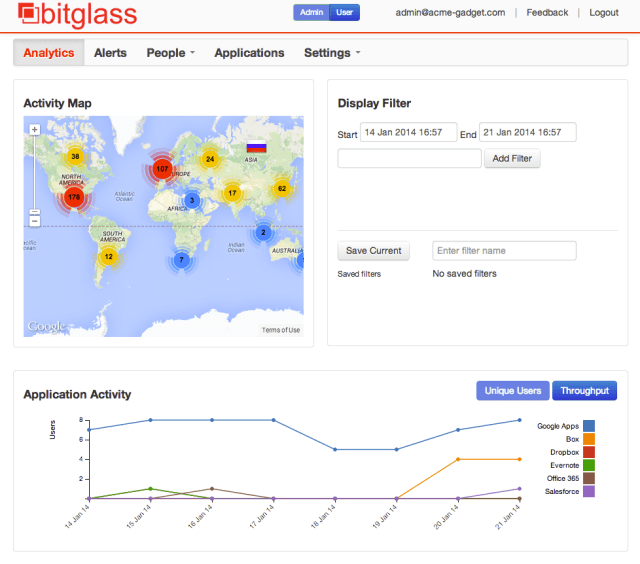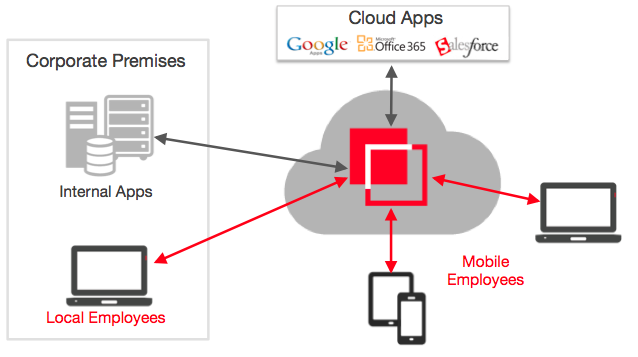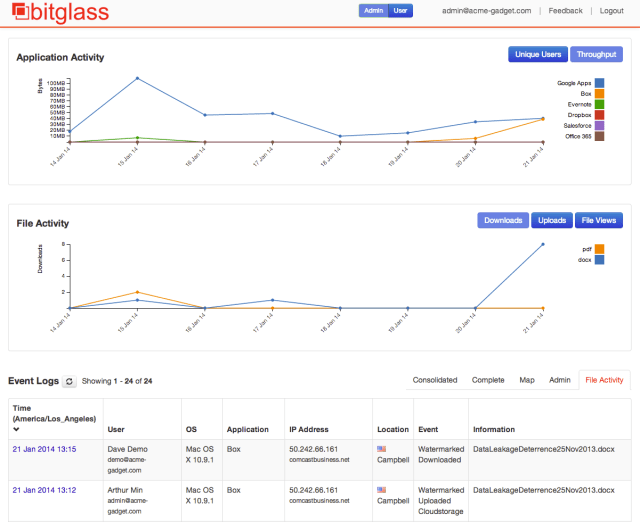Bitglass, the stealthy enterprise startup which last year had raised $10 million in Series A funding in an oversubscribed round from NEA and Norwest Venture Partners, is today opening its doors. The company is focusing on a much-needed area with regard to businesses’ shift from on-premise solutions to cloud services, like Google Apps, Salesforce, Box, Dropbox and others: data security.
With Bitglass, companies are able to protect, secure and track sensitive corporate data without having to first install client software on employee laptops or mobile devices – a notable leap in terms of how things typically work today in the enterprise environment.
Formerly based in Palo Alto but now a bit further south in Campbell, Calif., Bitglass was founded by Nat Kausik (CEO), who previously worked at HP for eight years, then later went on to found other companies including Arcot and FineGround, acquired by Computer Associates and Cisco, respectively. Meanwhile, Bitglass co-founder and CTO Anurag Kahol, was director of engineering at Juniper Networks, and spent 11 years at Cisco, which is where the two founders first met.
In the Silicon Valley ecosystem, where youth is sometimes overvalued, Kausik describes himself, with a laugh, as “an old fart.” But, in this case, that’s not a bad thing. “This is my fifth startup, so to speak,” he says. “I tried retiring…but it was boring. What can I tell you? I enjoy building companies.”
Kausik says that Kahol came to him last year with an idea for a security solution that would protect data stored in cloud services. At Juniper Networks, he had been working on security solutions for corporate networks, which he realized was the opposite of where much of the world was headed — to the cloud and to mobile devices.

“Data goes from Salesforce or Google Apps on AT&T directly to somebody’s mobile phone,” explains Kausik, as to why those other solutions were relatively “meaningless” today. “Data never touches the corporate network at all,” he says.
In January 2013, the two teamed up to found Bitglass, a SaaS (software-as-a-service) security solution designed for enterprise customers whose data is stored in the cloud and on employees’ mobile devices, including personal devices they bring from home via corporate BYOD programs.
The issue for businesses with this shift is that there isn’t as much security, encryption and tracking that can be done when data is stored and accessed off site and through personal devices which aren’t connected to the company’s own internal network. Meanwhile, the current crop of solutions have dealt with the problem largely by forcing employees to install and run client software on their phones and computers in order to access protected files, corporate email, calendars and more.

“The challenge is that the employee wants privacy and mobility,” says Kausik. They don’t want the company sniffing or tracking their personal activity, like which apps they’re downloading, how they’re using the phone, where they’re located, and more. Meanwhile, companies need to secure their data. “That’s the problem we’re solving,” he says.
To accomplish this, Bitglass provides corporate IT with a number of services, including cloud app security, mobile security, and cloud access control. Bitglass sets up a proxy to capture the traffic when an employee logs into corporate file stores, like Google Apps or Box or anything else. It does this by way of a single-sign-on solution where, for example, if a company used to direct users to login via something like “sso.company.com” they would instead login via a Bitglass domain (e.g. “bitglass.net”).

Most business customers Bitglass works with already have a single-sign-on solution in place, but if they didn’t, Bitglass would provide one.
Once authenticated, Bitglass watches every action an employee takes when using cloud applications, including the who, what, when, where and how that corporate data is used. In addition to this logging, cloud documents can also be watermarked (by default, employees are alerted to this) for tracking purposes that extend beyond what the employee him or herself does with the file. It can watch as the data is shared outside the company, or if it’s copied and pasted into a new file which is then transferred elsewhere, or stolen.

Bitglass can also remotely wipe mobile devices. This a feature a number of mobile device management solutions, like MobileIron or AirWatch, can also do today. However, in Bitglass’s case, the company doesn’t install a client software or agent on the device. “The Holy Grail is to be able to wipe only corporate data from the phone, but not install software or track what employees do in their private life,” Kausik explains.
He says that when customers needs to wipe a phone, the next time the phone syncs with the server, it simply sucks all the data out of the mailbox, so it’s out of the employee’s reach. At launch, the mobile piece only works with email, calendars and contacts, but support for cloud storage is planned for later this quarter.
The 30-person company has been testing Bitglass with 60 corporate customers since last September, including those in the financial and medical/biotech space. Some portion of these have converted to paying users. Bitglass is priced at $10 per user per month, notes Kausik, and customers generally sign annual contracts.
NEA’s Forest Baskett and Scott Sandell, as well as Norwest’s Matthew Howard, join the board as a result of the $10 million raise.
